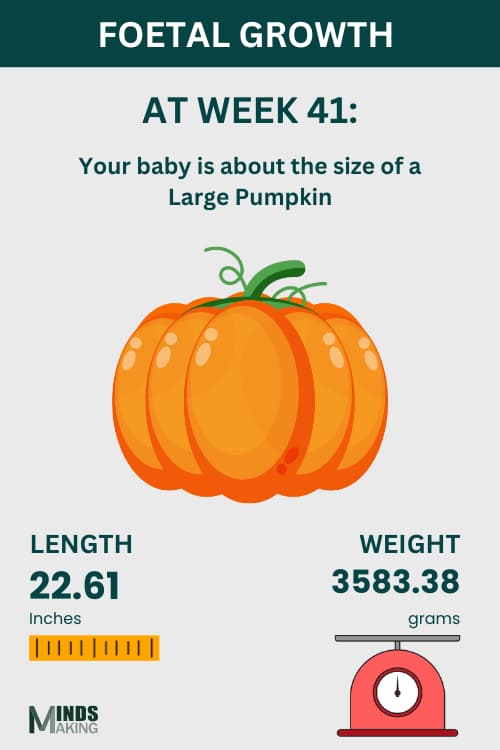Your Pregnancy at Week 41
Science photo library

Written by Mindsmaking Medical Writer
Fact Checked by Mindsmaking Professionals
27th, July, 2025
At 41 weeks pregnant, you're officially overdue, and while waiting can be tough, your baby is still preparing for their big arrival.
Reaching week 41 of pregnancy can indeed bring about a mix of emotions. Your due date has already passed at this stage, and it's natural to feel various things, from excitement to meet your baby to frustration or anxiety about the wait. Some people might enjoy these final days, resting, preparing, or relishing the quiet moments before the baby arrives. However, feeling fed up or impatient is just as common, especially if you're physically uncomfortable or eager to move on to the next chapter.
Around this time, your midwife will likely talk to you about the possibility of inducing labour. Induction is when labour is medically started rather than waiting for it to begin naturally. It's crucial to clearly understand why your medical team is recommending an induction of labour and to take the time to discuss the potential risks and benefits. This will help you make an informed decision about whether you want to proceed.
Key Takeaways
It's common for newborns to have swollen genitals due to hormones, but this will return to a normal size over time.
Your baby measures around 22.61 inches and weighs about 3583.38 grams, comparable to a large pumpkin.
It's common for babies to be born after their due date; about 20% are born at 41 weeks or later.
Increased pelvic pressure can lead to varicose veins, causing haemorrhoids (piles). They may worsen during childbirth but usually decrease in swelling and pain after labour.
At 41 weeks pregnant, you should contact your doctor immediately if you experience a noticeable decrease in your baby's movements, severe cramping or vaginal bleeding.
Avoid stressing about when labour will start, as your body and baby will begin the process when ready. Over-planning can cause unnecessary anxiety.
Keeping a calm and positive attitude can be comforting and help reduce stress for both of you.
Learning about post-term pregnancy ensures you feel informed and confident throughout your pregnancy.
Take a peek

Nail care
After delivery, your baby's nails will surely need a trim with baby nail clippers as they have grown past her fingertips.

Swollen Genitals
It's common for a newborn's genitals to look swollen at birth due to exposure to hormones. This swelling is temporary, and their genitals will return to a normal size in time.

Dry skin
Overdue babies often have red, dry, and peeling skin because they have lost their vernix, the protective layer that keeps their skin from drying out in the amniotic fluid.
Baby Development at Week 41
Your baby is getting ready to take its first breath outside the womb, which will be the first time the air sacs in its lungs inflate. Keep monitoring its movements, and if you notice any decrease in activity, contact your midwife immediately.
Your baby's nails are likely long by now, although you might not notice this right away since their hands gem will probably be clenched into tiny fists for the first few weeks after birth. It's also common for a newborn's genitals to appear swollen at birth due to hormones, but they will return to a normal size over time.
Overdue babies tend to have red, dry and peeling skin due to the loss of vernix, the protective, greasy coating that keeps their skin from drying out in the amniotic fluid. Avoid applying moisturiser to your baby's rough skin, as it may worsen the condition. The red, peeling skin will naturally shed in a few days, revealing healthy skin underneath. (2)
This week, your baby will have grown more, and the vernix will have mostly absorbed into the amniotic fluid. This changes the fluid from clear and pale to a milky colour. Research suggests that as your baby nears readiness for birth, it releases hormones that signal the placenta to initiate labour. Although your baby remains safe inside you, they are actively helping to prepare your body for childbirth. (1)
Mindsmakin

Body Changes at Week 41
You may have experienced Braxton Hicks contractions, or false labour contractions, during your pregnancy and wondered if they can occur close to delivery. The answer is yes; Braxton Hicks contractions can continue until you give birth as they help prepare your body for labour.
Braxton Hicks contractions are typically felt at the front of your abdomen, may be painless, and occur at irregular intervals. They can mimic the sensation of contractions without actually being labour. True labour contractions involve intermittent tightening and relaxing of the uterine muscles, become more frequent and intense, and last about 60 to 90 seconds. If contractions occur every five minutes, it's time to contact your healthcare provider.
If your due date has passed and your baby hasn't arrived yet, it's important to understand that this is quite common. About 20% of babies are born at 41 weeks or later. To help start labour, you might be offered a membrane sweep, a procedure that can encourage the onset of labour. If labour doesn't begin naturally after this, another sweep may be offered, and your midwife will discuss further options with you.
Induction of labour is usually recommended at this stage. A 2019 study indicated that inducing labour at 41 weeks is preferable to waiting for spontaneous labour in reducing the risk of stillbirths. (3)
If your pregnancy goes beyond 42 weeks, it is classified as prolonged, and the risk of complications for both you and your baby is higher. Your midwife will explain these risks and discuss the induction option with you.
Read This Next
No posts available
Pregnancy Symptoms at Week 41

Clumsiness
Clumsiness is quite common due to the extra weight you're carrying, which shifts your centre of gravity and affects your balance. Additionally, the hormone relaxin causes your joints and muscles to loosen, making your fingers and toes less stable. Fatigue and lapses in concentration can also contribute to dropping things or bumping into objects. While these symptoms usually subside after birth, it's a good idea to contact your medical team for further guidance if they persist.

Haemorrhoids
The increased pelvic pressure, which pushes down into your bottom, can lead to varicose veins. These veins can then cause haemorrhoids, also known as piles. Haemorrhoids can be uncomfortable, and they may worsen during childbirth as you push your baby out. However, the swelling and pain typically decrease after labour.

Urine leakage
Your baby's head is likely pressing on your bladder now, which may cause bladder leakage when you cough, laugh, or sneeze. You might want to wear a sanitary pad if needed to stay dry. There's no need to feel embarrassed, many mothers have experienced this during their pregnancies.

Difficulty sleeping
It's normal to struggle during the final weeks of pregnancy. Your hormones are fluctuating, and your nerves about the upcoming birth can make it difficult to rest. This is completely understandable and common. Once your baby arrives, sleep will likely be even more elusive, so in a way, this period can be seen as preparation. However, it's important to rest whenever you can. Since you're probably on maternity leave by now, take advantage of any daytime drowsiness and nap whenever you feel sleepy, even during the day.

Diarrhoea or nausea
As you approach labour, it's quite common to experience diarrhoea or nausea. This happens because your body is preparing for childbirth, and the muscles throughout your body, including those in your intestines and rectum, are loosening to make room for the baby. These symptoms are a normal part of your body's preparation for labour.
Pregnancy Concerns at Week 41
At 41 weeks pregnant, you should contact your doctor immediately if you experience any of the following:
- A noticeable decrease in your baby's movements
- Severe cramping
- Vaginal bleeding
- Intense heartburn
- Unusual changes in vaginal discharge
- Severe headaches or blurred vision
- Fever
- Severe vomiting
- Dizziness or fainting
Health Tips for Pregnancy Week 41
Don't overthink
The idea is to give yourself a break from stressing about the timing of labour. Your body and baby will start the process when they're ready, so over-planning or worrying about it can create unnecessary stress and anxiety. Taking a step back and focusing on relaxing allows things to unfold naturally without added pressure.
Get adequate rest
It's important to rest whenever you can, even if it means napping during the day. As sleep may become more challenging due to physical discomfort and anxiety about labour, finding ways to maximise comfort can make a big difference. Use supportive pillows to cushion your body, especially if you're experiencing back pain or pressure. Experiment with different sleeping positions and relaxation techniques, such as deep breathing or gentle stretching, to help ease discomfort and promote better rest.
Monitor baby's movement
Monitoring your baby's movements is essential to ensure they're well and thriving in the final weeks of pregnancy. Regularly track how often you feel your baby moving and note any changes in the pattern or frequency. Reduced movement can indicate potential issues, so if you notice a significant decrease or if your baby's movements suddenly change, it's important to contact your healthcare provider immediately.
Stay Hydrated
Drink plenty of water to stay hydrated, which is important for your overall health and helps prevent complications like swelling and constipation.
Go for a lengthy walk
Taking a long walk at 41 weeks of pregnancy can be beneficial if you have the energy. Walking helps to apply gentle pressure on your cervix from your baby's head, which can encourage the cervix to thin (efface) and open (dilate). The movement and gravity involved in walking may also help your baby to get into the optimal position for birth, potentially stimulating the onset of labour. However, listen to your body and avoid overexerting yourself. Consult your healthcare provider before starting a new activity if you have concerns.
Advice For Partners
- Your partner may be feeling anxious or frustrated as the due date passes. Offer reassurance and patience, and remind her that it's normal for babies to be born a week or two after the due date.
- Help her manage discomfort by assisting with tasks like arranging pillows, providing gentle massages, or helping her find comfortable positions to relax.
- Make sure you have everything ready for when labour begins. This includes packing a hospital bag, ensuring the car is ready, and having any necessary documents or items at hand.
- If discussions about induction or other medical interventions arise, listen and support her decisions. Offer to accompany her to appointments and be involved in the discussions with healthcare professionals.
- Offer emotional support by being a good listener and encouraging her. The final stages of pregnancy can be emotionally intense, and your support will be crucial.
- Keep a calm and positive attitude. Your reassurance and calmness can be comforting and help reduce stress for both of you.
- Educate yourself about the labour and delivery process to be an informed and supportive partner.
Pregnancy Checklist for Week 41
- Waiting for your baby to arrive can be frustrating. To keep your spirits up, plan a week filled with enjoyable activities, like meeting up with a friend or treating yourself to a massage. This way, you'll have something to look forward to.
- Listen to pregnancy relaxation audio, read positive affirmations, and practise your breathing techniques to help maintain a positive mindset, your baby will be here before you know it.
- Learn about "post-term pregnancy" to ensure you feel informed and confident throughout your pregnancy.
- Be ready for labour at any moment, as it can happen unexpectedly. Keep your hospital bag with you whenever you leave home, or store it in your car. Also, bring it to your prenatal appointments in case you need to be admitted.
Frequently Asked Questions
How big is my baby at week 41?
At 41 weeks of gestation, your baby is approximately the size of a large pumpkin, measuring about 22 to 24 inches in length and weighing about 3583.38 grams. Remember that every baby is unique, so your little one might be slightly larger or smaller at birth.
Can I do anything to help start labour at 41 weeks?
Before trying any at-home labour induction methods, it is important to discuss them with your healthcare provider. Some techniques could pose risks to your health or your baby's health. If your provider approves light exercise, activities like squats, yoga, and walking can benefit. These exercises can help with the baby's positioning and alignment, which may aid in preparing your body for labour.
Is it ok to be 41 weeks pregnant?
It's normal if you haven't given birth exactly on your due date. A due date is an estimate based on various factors, and it's common for babies to be born a week or two before or after that date. This range is still considered normal. You're not considered "post-term" until you reach 42 weeks of pregnancy. So, there's no need to worry, both you and your baby are doing well!
Why isn't my cervix dilating at 41 weeks?
As you approach labour, you might notice that your baby has dropped lower into your pelvis, a sign they're getting ready for birth. You may also start to feel initial labour pains, making it seem like delivery is just around the corner. However, if your doctor checks and finds that your cervix hasn't started to dilate yet, it can be confusing and frustrating. It's important to know that your cervix might not begin dilating until you're closer to active labour. Your body is still preparing for delivery, and this could be the final stage before labour truly begins.
Was this article helpful?
How many stars are you giving this article?
Leave a comment
Your email address will not be published.










































